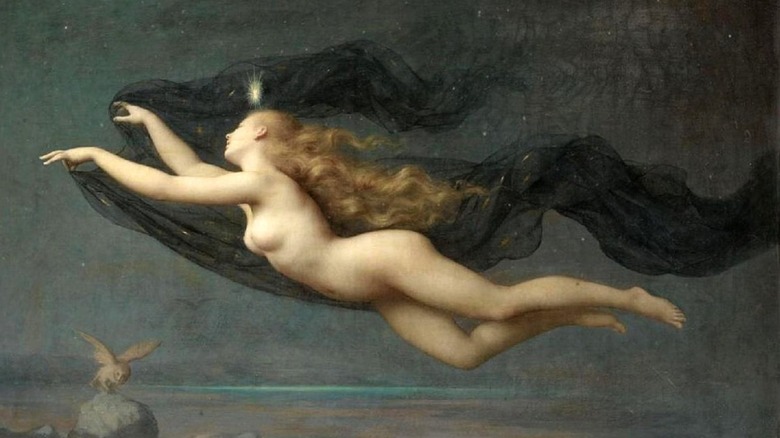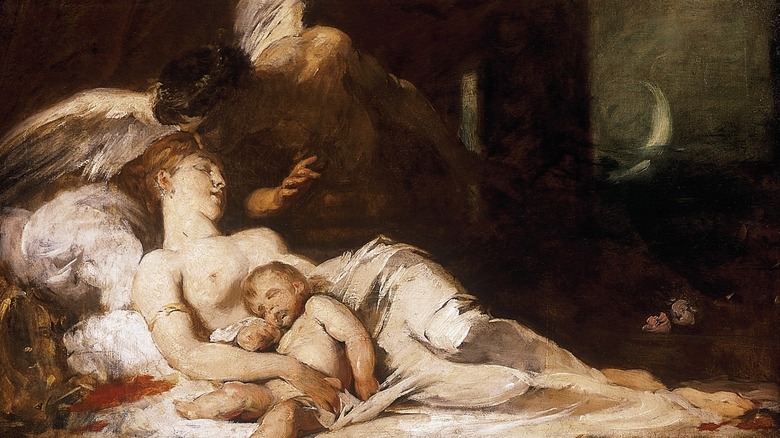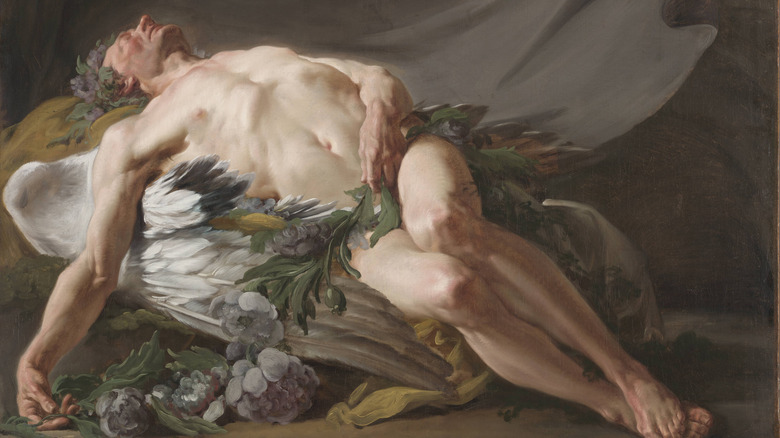The Mythological Link Between Sleep And Death In Ancient Greece
Even without knowing specifics, many folks know that the Greek pantheon of gods is basically a big, messed up, royal family. Backstabbing and betrayal, feuds and rivalries, pettiness and power, murder and torture, incest and rape: yep, Zeus and company aren't very different from humanity's worst. However, it's important to note that each god played a highly symbolic role to the Greeks, and was meant to teach a lesson. Ares, for instance, the petulant, ill-mannered, and much-despised god of war and bloodshed? He was the byproduct of history's most dysfunctional marriage between embittered spouses, Zeus and Hera, as World History Encyclopedia says.
But even within such a tangle of gods, roles, and symbolism, certain branches of the Olympian family tree stand out, as History Cooperative explains. For instance, the gods are actually the younger generation of cosmic deities after the titans. In a traitorous coup for power, Zeus plotted to overthrow the previous royals and install his own family in their place. And the titans? They'd overthrown the original generation of deities, the primordial gods.
The underworld has its own nifty family branch, too, with Erebus being its creator and Hades being the banished one who presides over it. As Greeking explains, Hades kidnapped Persephone, the daughter of seasonal change herself, and when Demeter goes to visit her daughter it turns to winter on Earth. And sleep, deceit, strife, vengeance, death, and more? They're all sons of night, one of the oldest, most powerful goddesses who terrifies even Zeus.
Sleep and death: twin sons of night
Hypnos (sleep) and Thanatos (death) are twins, as Theoi tells us. This makes them unique among the sons of Nyx (night), an ancient being formed directly from the original chaos of the cosmos along with Erebus (darkness), as History Cooperative explains. And together, night and darkness — the default state of the universe before light and matter — consumed all of existence. They present a final barrier of power even to the gods of Olympus and their king, Zeus. And together, Nyx and Erebus birthed all the gods of night and darkness, including sleep and death.
Even today, sleep is a mystery. Renowned universities like Harvard can describe on Healthy Sleep what happens when we sleep, and what functions it serves regarding tissue regeneration, growth during development periods, and so forth. Research on the National Institute of Neurological Disorders and Stroke describes how the brain remains active while sleeping, and how sleep plays a "housekeeping role" to the body. But we still can't answer the simple question, "Why do we sleep?" There are a few possibilities, largely related to energy conservation at times of less hunting when it's dark outside, but in the end no one really knows.
So the Greek way of looking at sleep and death should make sense: Death is like an eternal sleep, and sleep a nightly death. They're presided over by gods of the most ancient and mysterious kind, beings who move well beyond mortal comprehension or purview.
A gentle way to go
The History Cooperative goes into a bit more depth about how the Greeks connected sleep and death. Hypnos (sleep) was a gentle, quiet deity who lived in the underworld and emerged at night to put people to sleep by tapping them with a magic wand. He had big, puffy wings that he used to travel and sometimes fan people to sleep. Hypnos' most prominent son was Morpheus (dreams). Morpheus, as History Cooperative also says, lived in a cave of poppy seeds where he and Hypnos cultivated the dreams of mortals. Many saw Morpheus not so much as a fell-fledged god, but more of a divine force called a daimon. That's because dreams could deliver either truth or lies — Morpheus could "morph" into any form, so to speak.
Thanatos (death), Hypnos' twin brother, was himself sometimes depicted as a daimon rather than a god, as History Cooperative yet again says. He didn't preside over all deaths, though, only peaceful ones like that of an elderly person dying while sleeping. This might be why artwork always depicts him as attractive, when he was depicted at all — he's the preferable, calmer way to go. Otherwise, Keres would escort someone to the underworld: twisted, fanged, bloody daimons who roved battlefields and presided over deaths of suffering, violence, and disease, as Theoi explains. Tellingly, Keres were not daughters of night — they were some aberrant, horrible force of unknown origin, perhaps first released from Pandora's Box.


